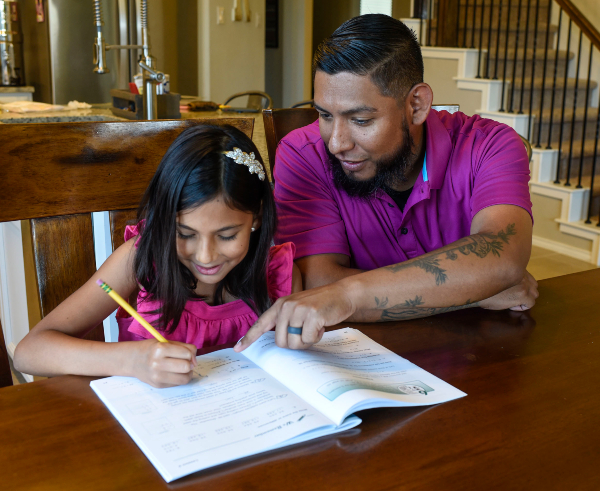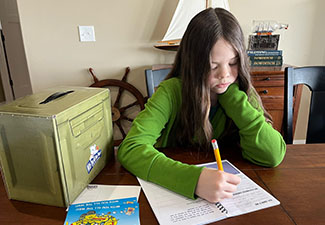5 Tips to Minimize Back-To-School Stress

Although students are often excited to head back to school, the early mornings, drama over homework, and ensuring everything makes it into a backpack can undoubtedly create stress in any household.
To ease the pressure, Wounded Warrior Project® (WWP) compiled five tips from warriors and their families that have helped them hit the books easily.
Keep Communication Open
It can be hard for children to share their feelings, especially when scared or overwhelmed.
Find opportunities to ask them how they feel, such as when buying back-to-school clothes or supplies. If a family member of your student is deployed, bring them into these conversations through video calls or recorded messages so the communication and connection remain open.
“It’s important to have an open discussion about any fears they have going back to school and then talk through ways for them to handle those feelings positively,” said Jenna Malone, mom of three children ages 11, 13, and 15. “We also taught our children to journal their thoughts and feelings.”
Jenna adds that it’s important to maintain communication once school is underway. “We share daily highs and lows, what went well and what didn’t,” she said.
Sometimes, talking to a person who has “been there” or maybe feeling the same way can also make a big difference. Encourage children to talk to their older siblings or friends to help release any nervous energy.
Shop Early and Embrace Discounts
Between growth spurts and growing supply lists, back-to-school shopping can get daunting. Take advantage of tax-free shopping weekends and military discounts offered by retailers.

Back-to-school shopping is an opportunity to talk to kids about their concerns.
In addition to saving money, it’s a great opportunity to teach your student(s) about financial readiness by involving them in the process.
Warrior Andrew Brewer and his wife Courtney prefer online shopping but say involving their three children provides an opportunity to discuss financial responsibility.
“A couple weeks before school starts, we have each kid go onto Amazon and add all the stuff they’d like for the new school year into the cart. We then go through it, and if there’s anything questionable – like a $150 backpack – we ask why they chose this and what it offers,” said Courtney.
"Then we explain finances and ask them to see if they can find something comparable more in our current budget. This allows them the freedom to get what they like, but it also allows us to help them understand money and budgets. It’s not just a no.”
Establish Routines and Review Expectations
Most students — and many adults — appreciate structure. Having a routine helps us feel more in control and can reduce stress.
School-time schedules may vary, but consider the following:
- Daily task list: Identify must-do tasks to complete each morning or evening, saving less important things for non-school days. This goes for both parents and kids.
- Designate study time and space: It’s important to have a dedicated space to study and focus. Also, set aside a specific time each day for homework.
- Plan time to recharge. Some days, juggling responsibilities be hard. Build in break times, which can help students and parents re-energize. Make time for snacks, a call with a friend, or combine family bonding and exercise with an after-dinner walk.
- Meal plan: Many parents dread the “What’s for dinner?” question. Avoid the headaches — and the fast-food drive-thru — by creating a weekly menu. Have children weigh in on their favorite meals and help with preparation.
- Set a bedtime and a winddown routine: Sleeping is essential for your brain and body. Turn off electronics at least an hour before bedtime, finish up important tasks, and then focus on an activity to unwind.
Air Force veteran Omy Emami encourages her two daughters to adjust their routines a week or two before school begins. “By gradually making adjustments ahead of time, it’s not as much of a shock when school starts,” said Omy’s daughter Sinaiyah, 15.

Adjusting sleep routines before school starts can lead to less stressful days.
Establish Limits and Embrace Self-Care
With school back in session, days and nights do get busier and seem to get more harried between homework, extracurricular activities, social events, and requests to volunteer. Remember that sometimes it’s OK to say no.
Self-care is important to maintain a healthy mindset.
For Omy, who is also the primary caregiver for her husband, Nima, it’s quiet time and exercise.
“I wake up early and enjoy a cup of coffee, my Bible, and my devotional. It helps me prepare for the day ahead,” Omy said. “I’ve also learned that if I don’t get some physical activity, my entire day is negatively impacted, so whether I want to or not, I either get on the treadmill or go out for a walk, depending on the weather.”
Give Yourself Grace but Ask for Help if Needed
No matter how hard you try, off days will happen. Buses will be missed, water bottles will be lost, and papers will be forgotten. Remind yourself and your students that everyone makes mistakes. And tomorrow is another day.
“It’s a new year with new expectations and new people. Give yourself and your kids some grace. I wouldn’t start a new job and be 100% the first day. We shouldn’t expect that from our kids, either," said Courtney.
Sinaiyah said she tries to remember this. “School is mostly talked about with disdain and can bring up a lot of emotions. But if we try to change our outlook and focus on the positives, we can enter another school year ready to learn and grow,” she said.
Back-to-school season can feel like a whirlwind, but it’s also filled with opportunities for new experiences. By keeping these tips in mind, families can create a supportive environment where everyone can thrive. If things get too overwhelming, help is available. WWP™ provides many resources for both warriors and their family members that can be helpful to ease into another school year, from in-person and virtual peer support groups to telephonic coaching.
Contact: Cynthia Weiss – Public Relations, cweiss@woundedwarriorproject.org, 904. 738.2589
About Wounded Warrior Project
Since 2003, Wounded Warrior Project® (WWP) has been meeting the growing needs of warriors, their families, and caregivers — helping them achieve their highest ambition. Learn more about Wounded Warrior Project.


